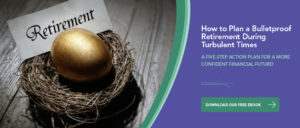“What if I Run Out of Money?”
Is a recession coming? Are you worried about running out of money after retirement? With the financial uncertainties caused by a likely 2023/2024 recession, global economic turmoil and increasing life expectancies, even some affluent families and individuals are growing apprehensive about their financial future.
However, there is a way to ease those fears—by getting proactive. If you create a comprehensive financial plan for your post-retirement years, you can ensure that your retirement savings last throughout your life. We just need to factor in all of your income sources, tax liabilities, and spending habits.
This article discusses these topics:
- It shouldn’t happen—start planning, financially, now
- Long-term care insurance for parents (& yourself)
- Plan an economic-weather-resistant portfolio
- Leverage an Accredited Investment Fiduciary®
It Shouldn’t Happen—Start Planning, Financially, Now
A lot of people think that retirement planning is something that only those close to leaving the workforce need to worry about. Others mistakenly assume that a lavish lifestyle today is evident proof that a comfortable retirement awaits them. Neither of these assumptions, however, is grounded in reality.
Recent economic headlines make it clear that even those with significant financial resources haven’t seen the last of inflation, bear markets, or the looming risk of a recession. Even if you enjoy affluence now, proactive steps must be taken to help ensure the security and quality of your retirement.
Otherwise, inflation and other factors threaten to reduce returns on your investments and erode your unprotected savings. That’s why it’s so important to strategize, financially, and consider proactive solutions. For example, one of the biggest reasons why you need to start saving for retirement now is because the cost of living is only going to go up.
At the same time, you might live longer than you think. Thanks to advances in medicine and healthcare, people are living longer than ever before. Becoming a 100-year-old once seemed rare, but it is increasingly common today. While longevity is generally considered a good thing, if you don’t have enough money saved up, you could find yourself running out of money later in life.
Long-Term Care Insurance for Parents (& Yourself)
The current economic climate is unstable, and a recession is looming on the horizon. Many people are worried about how they will maintain their current lifestyle (especially in retirement, once reliant upon a fixed income) if a recession hits. Long-term care insurance can be an invaluable tool during times of economic instability.
This coverage helps pay for the cost of long-term care services, including nursing homes, home health care, assisted living facilities, adult daycare, and hospice care. To say the least, it can help make caring for aging parents more affordable. Demand for it stems from the rising cost of long-term health care in the near and distant future.
It’s not something to put off until the last minute (for your parents or yourself), however: Long-term care insurance policies typically have a waiting period of 3 to 6 months before benefits start kicking in. Costs typically depend on a number of factors, including your age, health, and specific coverage choices.
The cost also tends to go up as you get older and develop health problems. Even during more stable economic periods, it’s worth it—if you want to protect your savings and assets from being depleted by the cost of long-term care.
Do Economic Downturns Have To Worry You as an Investor? Read Why We Don’t Think So at All.
Plan an Economic-Weather-Resistant Portfolio
There are a lot of things we can’t control when it comes to investing. The stock market is periodically volatile and even the best-laid plans can go awry in the face of sudden economic downturns. However, you can take measures to weatherproof your investment portfolio and protect your savings.
The first strategy that we’ll discuss is diversification. This investment strategy involves spreading your equity (meaning your invested funds) across a variety of asset types. In the simplest terms, it’s essentially hedging your bets against any one particular asset class going performing poorly.
For example, let’s say that you have all of your money invested in small company stocks: If the market turns unstable, your entire investment portfolio can take it on the chin. However, if you have a mix of stocks, bonds, real estate, and cash, then you’re potentially better protected in the event of a downturn.
That’s because not all asset classes move in lockstep with each other. So, even while your stocks are taking a beating, your bonds, real estate, and cash could be doing just fine. The key to successful diversification is making sure that you’ve invested in a variety of different enough asset classes to have a low correlation with each other.
Another strategy worth considering is tax loss harvesting. This is a strategy whereby investors sell losing investments at a loss in order to offset capital gains elsewhere in their portfolio. For example, let’s say that you have $10,000 invested in Stock A, which has gone up by 10% over the course of the year (meaning that it’s now worth $11,000).
You also have $5,000 invested in Stock B, which has gone down by 5% over the course of the year (meaning that it’s now worth $4,750). So, if you were to sell both investments today and reinvest the proceeds elsewhere, you would incur a capital gain of $1,000 on Stock A (10% x $10,000) and a capital loss of $250 on Stock B (5% x $5 000).
However, because capital losses can be used to offset capital gains elsewhere in your portfolio, you might only end up paying taxes on your net capital gain of $750 ($1 000 – $250). In addition to helping you minimize your tax bill, it also gives you an opportunity to rebalance your portfolio.
Now let’s say that, for instance, after selling Stock A and Stock B, you decide to reinvest the proceeds into a new investment, Stock C: This newly-acquired asset has gone up by 15% over the course of the year (meaning that it’s now worth $5 750). Therefore, by selling off your losing investments and reinvesting the proceeds into a winning investment, you can minimize your tax bill while increasing the overall value of your investment portfolio.
Leverage an Accredited Investment Fiduciary®

There’s no magic bullet when it comes to saving or investing. However, you can give yourself a fighting chance against economic downturns. If you’re proactive enough, running out of money shouldn’t be a concern now or in retirement. It’s chiefly a matter of taking concrete steps to protect your wealth.
Once you’ve taken care of it, you can know that you’ve done everything within your power to safeguard your financial future. That, in turn, should breed peace of mind. As an Accredited Investment Fiduciary® (AIF®) to high-net-worth individuals and families, I can tell you: It is still possible to retire with confidence in Woodbridge.
Contact us or schedule a meeting to learn more about estate planning, high-net-worth retirement planning, and other smart wealth management moves.


